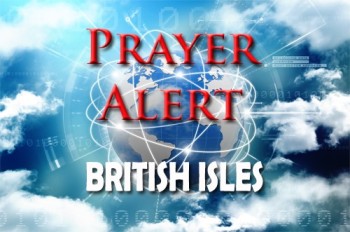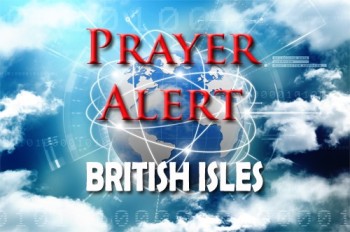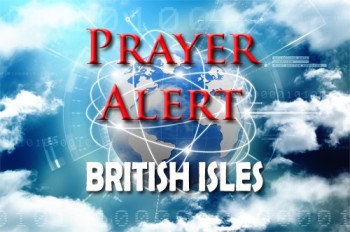Empowering children for a lifestyle of Prayer and Service to Transform our World
News & Events
Displaying items by tag: heatwave
England: fourth heatwave increases water crisis
England is facing a deepening water crisis, with five regions officially in drought and six more experiencing prolonged dry conditions - the worst since 1976. Despite brief storms in July, river flows and reservoir levels continue to decline, exacerbated by the fourth heatwave of the summer which began on 12 August. An amber heat health alert now covers key regions, including London and the south-east, as temperatures threaten to break this year’s record of 35.8°C. The UK Health Security Agency warns the heat could further strain public water supplies and navigation channels. The National Drought Group, composed of government bodies and industry stakeholders, has called for urgent, coordinated action. While the public has made efforts to reduce water use, concerns persist over damaged crops, reduced farm yields, and long-term food security. Farmers, in particular, face devastating losses. They are calling for improved water infrastructure and a more effective planning system to tackle both drought and flood threats in future climate extremes. Meanwhile, the Met Office has warned that extreme weather is becoming the new normal in the UK: see See also the Europe article on wildfires.
Greece: wildfires threaten large city, European heatwave
Fast-moving wildfires have reached the outskirts of Patras, Greece’s third-largest city, forcing mass evacuations, including a children’s hospital, and destroying thousands of hectares in the surrounding region. Entire villages have been emptied, homes and businesses lost, and hundreds of vehicles incinerated. Strong winds and soaring temperatures, reaching 38°C, have worsened the crisis, while smoke has caused respiratory problems for many residents. Across Greece, over 4,800 firefighters are battling more than 20 blazes, with EU water bombers requested for support. The crisis is part of a broader southern Europe heatwave, with deadly fires in Spain, large outbreaks in Portugal, Albania, and Italy, and record-high temperatures threatening lives and infrastructure. Meteorologists say such extremes are becoming more frequent and intense due to human-induced climate change. See also UK article ‘fourth heatwave’.
Europe: severe heatwave, record temperatures, wildfires
A severe early-summer heatwave is scorching much of Europe, triggering wildfires, evacuations, and health alerts across multiple countries. In Turkey, over 50,000 people have been evacuated due to wildfires, especially near Izmir. France has faced peak temperatures of 40°C, with wildfires prompting evacuations. Spain is on track for its hottest June ever, with Seville reaching 42°C. Italy issued red heat alerts for 16 cities and may restrict working outdoors. Germany is also issuing warnings, urging water conservation while facing disrupted river shipping because the water level of the Rhine has dropped. UN secretary-general António Guterres has commented, ‘Extreme heat is no longer a rare event – it has become the new normal.’ Heatwaves are already the world’s deadliest weather hazard, killing nearly half a million people annually, surpassing the toll from floods, hurricanes, and earthquakes combined.
Balkans / Greece / Ukraine: heatwave causes huge problems
The Balkans, along with much of Europe, are enduring a prolonged heatwave, which has led to the unprecedented drying up of Serbia's Rusanda salt lake. An expert has warned that such heatwaves could become more frequent due to climate change. Temperatures in the Balkans have soared to 39°C (102°F), and the Adriatic Sea reached a record-high temperature of 29.5°C in Croatian coastal resorts. North Macedonia and Albania have deployed resources to combat forest fires, with North Macedonia declaring a state of emergency. The World Bank has highlighted the need for significant investment to mitigate the impact of climate change. Other European countries, including Italy, Greece, and France, are also experiencing extreme heat. In Ukraine, rain is forecast on 18 July, to break the pattern of several weeks of abnormally high temperatures; the country’s grain harvest is likely to be significantly reduced.
Asia: severe heatwave
The worst April heatwave in Asian history is causing deaths and forcing schools to close. Temperatures of over 40C in Bangladesh have caused road surfaces to melt, and if the heat does not abate the ministry of environment will declare a temperature emergency. Six cities in India recorded temperatures above 44C. India has become particularly vulnerable to extreme heat recently; experts fear 2023 could be even worse. As temperatures and humidity soar, causing an orange severe heatwave warning, rural workers and labourers are forced to work outside. Weekend thunderstorms could abate conditions, but extreme heat is projected to continue into next week. Thailand has issued heatstroke health warnings and the high temperatures could continue beyond the usual summer months, causing drought and crop failure. China reported record-breaking temperatures for April in many locations, and over a dozen countries are experiencing similar problems. The death toll is expected to rise. Pray for the frail and elderly to drink enough fluids, including in the UK as meteorologists forecast an even hotter summer for us than in 2022.
Drought and hosepipe bans
A prolonged dry spell and record-breaking temperatures have left rivers at exceptionally low levels, depleted reservoirs, and dried-out soils. Environment secretary George Eustice has urged more firms to take action to mitigate the effects of the prolonged dry weather. But each water company has different thresholds and demands, so we might not see a UK-wide ban. Sir Robert Goodwill, chairman of the environment, food and rural affairs select committee said, ‘It costs water companies money to impose a hosepipe ban and I suspect they have held off longer than they would have done twenty years ago when most people were unmetered and just paid their water rate.’ His comments come as the UK prepares to declare a drought. Water UK say that climate change and an increasing population mean there could be water shortages by 2050. On 10 August Thames Water sent water tankers to residents in the first place in Britain to run dry when Stokenchurch reservoir was found to contain E.coli.
England and Wales: extreme weather warning
The Met Office has issued an extreme heat weather warning (Level 3 Alert) for most of England and parts of Wales, with temperatures building, especially from 16 to 19 July when the maximum could reach 38C. There could be a danger to life or potential serious illness; there could be widespread impact on infrastructure, with road closures and cancellations or delays to rail and air travel. Health minister Maria Caulfield said that a heatwave plan is being actioned; also a NHS hot weather plan is in place. Pray for health and social care workers to pay particular attention to the elderly and vulnerable. Pray for councils and boroughs to conduct welfare checks on vulnerable street people and rough sleepers. Pray for parents to watch young children for signs of heat exhaustion. In England, there were 2,500 excess deaths in the summer of 2020 as a result of hot weather.
Europe: wildfires rage in heatwave
All week Europe has been battling wildfires fuelled by soaring temperatures in Portugal, France, Turkey and Spain. Pray for 3,500 Portuguese firefighters battling dozens of blazes in record-breaking temperatures. Pray for the 600 people in Leiria who were forced out of their homes, and over 3,000 who were evacuated in Turkey. Pray for devastated people like 77-year-old Adelino, a Portuguese farmer who said, ‘Everything burned. It looked like the end of the world.’ Pray for Spanish farmers who have lost over 70,300 hectares. Pray for 1,000 French firefighters trying to control two major wildfires. 4,000 hectares have already burned in southwest France.
Japan: Worst heatwave since 1875
Japan is sweltering under its worst heatwave for almost 150 years. The city of Isesaki, northwest of the capital, saw a record 40.2C - the highest temperature ever recorded for Japan. There are official warnings of a looming power shortage and calls for people to conserve energy where possible. But the government is still advising people to use air conditioning to avoid heatstroke as cases of hospitalisation rise with the heat. Meteorologists warn the heat will continue in the coming days. Pray for the elderly and those with heart disease. In the heat blood vessels open up, leading to lower blood pressure. The heart works harder to push the blood around the body which could lead to a heart attack. Weather officials warn the heat is likely to continue in the coming days. See also
India: discrimination, floods, heatwave
India is the most ethnically diverse nation on earth, with over 2,500 people groups, 22 official languages, and thousands of castes. It hosts most of the world’s Hindus and Muslims. The country traditionally maintains free speech and religious freedom, but these are being tested by Hindu nationalism; this mainly targets Muslims, but Christians also face discrimination, persecution and anti-conversion laws. Pray that India’s proud traditions of tolerance and freedom will continue and strengthen. Its churches have sent 100,000 people across India to communicate the gospel, start churches, and relieve suffering and injustice: resulting in tens of thousands of new congregations. Pray that this amazing missionary movement will transform India through Christ. However, this week the most urgent prayer need is for the millions displaced by floods in the north and 25 days of heatwave in densely-populated Delhi, where vast numbers are falling ill from heatstroke. Some have little access to clean water.











